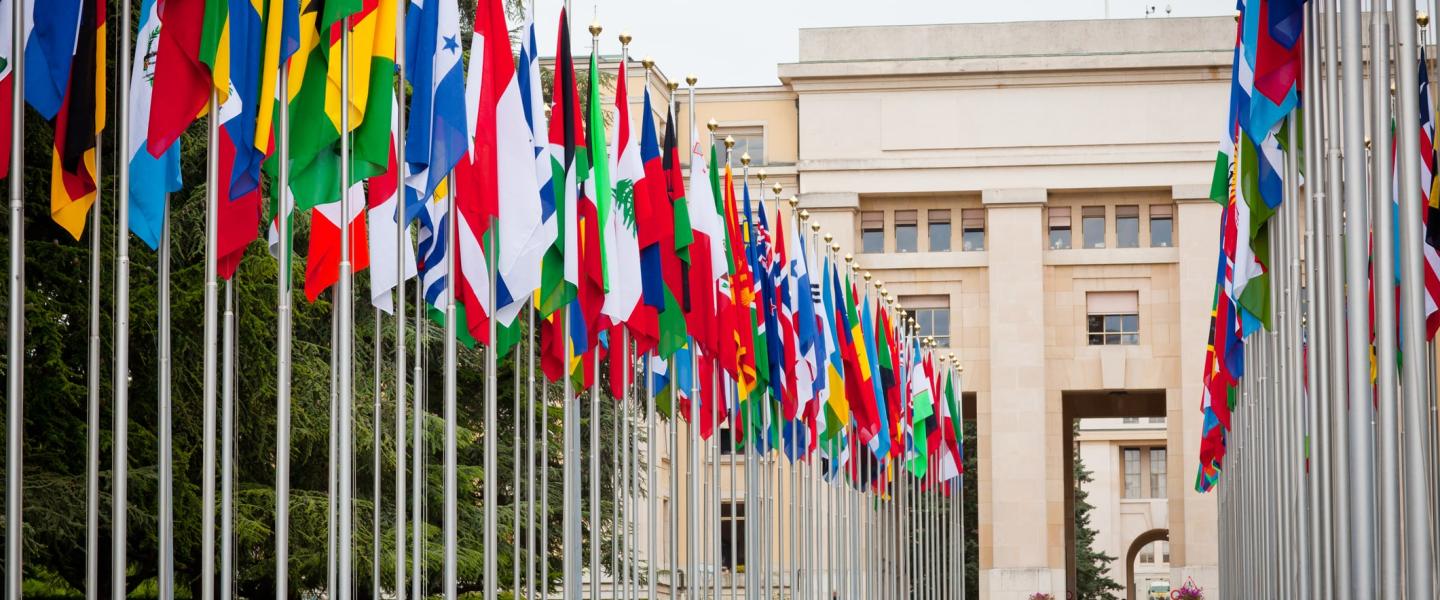Momentum is building behind the Geneva Declaration on Human Rights at Sea in Australia’s international law community with the support of Dr Natalie Klein, a professor at UNSW Sydney’s Faculty of Law & Justice and recently appointed HRAS Trustee
The declaration is the focal point of Dr Klein’s forthcoming academic paper, titled Geneva Declaration on Human Rights at Sea: An Endeavour to Connect Law of the Sea and International Human Rights Law. Dr Klein also discussed the declaration on an expert panel at the 29th annual conference of the Australian and New Zealand Society of International Law in Canberra earlier this month.
The Geneva Declaration on Human Rights at Sea (GDHRAS) was launched on 1 March this year, bringing into effect HRAS’s founding principle that human rights apply at sea as they do on land.
Dr Klein’s academic paper explores how the GDHRAS aligns with the existing law of the sea to address human rights violations occurring in the maritime domain. She said one of the most important features of the declaration is its accessibility to a wide range of audiences.
“The guidelines are written in a way intended for anybody to pick up,” Dr Klein said.
“You don’t have to be a lawyer to look at it, the idea being that somebody who works at a port or who is involved with a local maritime authority can pick [the declaration] up, and it will tell them what they can do to enforce human rights within their local jurisdiction.”
Dr Klein said the human rights principles set out in the declaration also extend beyond specific groups and issues at sea to protect the rights of the entire maritime population. As noted in the GDHRAS, there are an estimated 30 million people at sea at a given moment.
“Part of the reason for [creating this declaration] was to be as encompassing as possible given the number of people operating at sea at any one time,” Dr Klein said.
“Being a lawyer, I focussed on the Guidelines for Promoting Compliance with Human Rights at Sea in Annex C … and also talked about where we go from here with the GDHRAS as a non-binding instrument and how it can influence international law.
“It’s got information about what port states can do, what coastal states can do, and most particularly, what flag states should be doing. Because, at the end of the day, there’s a lot of law there. The issue is getting it enforced and implemented.”
Dr Klein said the GDHRAS could reinforce the connection between the international human rights regime and the law of the sea. She said the law of the sea hasn’t traditionally gone into detail about the rights of those at sea, which in some circumstances has created space for those rights to be disregarded.
“The law of the sea is mostly based on rights and duties that apply between different countries, without thinking much about the humans who are on the vessels that are talked about, and the particular duties countries have,” she said.
“The GDHRAS is very much bringing to light the fact that [the law of the sea and human rights] are connected.”
Although the GDHRAS is still in an early stage as a non-binding instrument, Dr Klein said she believes there is potential for growth and the prospect of the declaration eventually evolving into a treaty.
“In the meantime, I think the GDHRAS can be a tool for states dealing with their domestic legislation,” she said.
Dr Klein said at this stage; governments should at least endorse the declaration and consider its practical advantages for domestic laws and policies. She said those policies should be updated to reflect the principles set out in the declaration and that the declaration can encourage governments to act on their existing human rights obligations.
“What we need is for states to think more carefully about how they can create the domestic authority to be able to act, to be able to arrest [offenders] and to be able to prosecute them if they come into port.”
According to Dr Klein, it is important for port states to shift their mindsets from simply acknowledging their authority to act on human rights violations to becoming proactive in exercising their authority.
“Whether that needs to be implemented into domestic law or in policy approach, it [involves] drilling down to the local implementation, and I think that’s an important path as much as getting the broader international recognition of the instrument itself.”
Dr Klein suggested implementation on domestic levels and support from other non-government organisations may establish the GDHRAS as a legally binding instrument in the future.
“Once you get that momentum from civil society, then at least democratic countries are going to start paying more attention.”
About Sharing. We welcome the use and dissemination of our work with proper accreditation. Please ensure that our Terms of Use are conformed with at all times.
